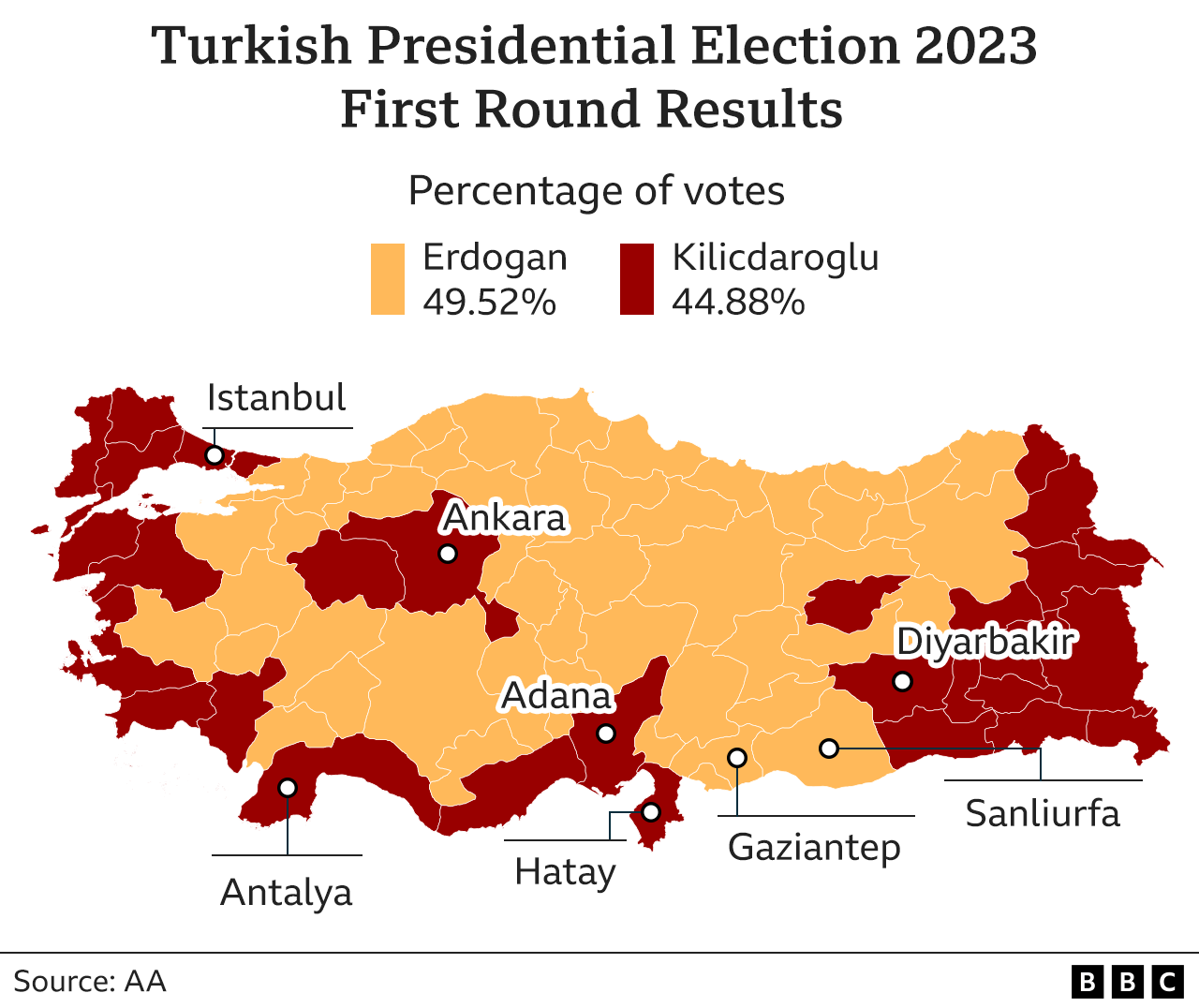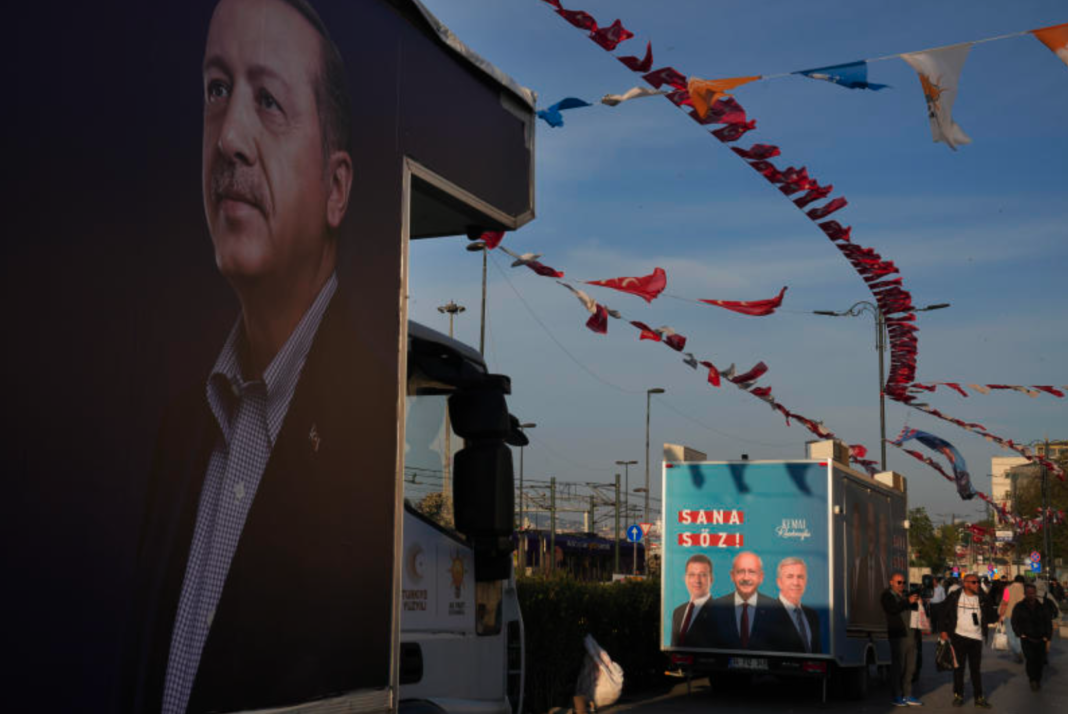When Turkish voters return to the polls in a week’s time to pick a president, their choice will make waves across the globe. Turkey’s future could look very different depending on who wins – and the world is watching. By Anna Foster in BBC News on May 20, 2023.
Turkey’s current president, Recep Tayyip Erdogan, has been in power for two decades. He has forged bonds with both East and West, but his increasingly authoritarian rule has led to friction with some allies.
Kemal Kilicdaroglu, the opposition challenger, has promised to restore Turkey’s democracy and improve human rights. Some Turks, though, question whether he has the presence on the world stage and commitment to security that Mr Erdogan has made his trademark.
Polls before the first round of the election on 14 May suggested the vote would be finely balanced between the two men. But when the ballots were counted, Mr Erdogan defied predictions, with a lead that now looks difficult for his opponent to overturn.

« Turkey is a country that I used to describe as one of our swing states, » explains Baroness Ashton, the EU’s former foreign policy chief.
« What happens in Turkey in terms of its democracy and in terms of its place in the region has a huge impact on Europe, on Asia, and of course on all of the global issues that we’re all grappling with. So it is really important. »
Since Russia’s invasion of Ukraine in 2022, Turkey has cemented its position as a valuable diplomatic broker. It facilitated some early talks between the warring nations, but made a real breakthrough only when it negotiated the crucial grain deal that has kept Ukrainian exports flowing through the heavily-mined Black Sea.
President Erdogan also prides himself on the lines of communication he keeps open with everyone from the UK Prime Minister Rishi Sunak and US President Joe Biden to Presidents Putin of Russia and Xi of China.
« Turkey has always had this ambition to be part of the West, » says Evren Balta, a professor in international relations at Istanbul’s Ozyegin University.
« This has not changed in the two decades of [Mr Erdogan’s AK Party] rule, » Prof Balta, continues. « But Turkey’s international alliances have diversified. It has pursued what we call ‘strategic autonomy’, the idea that countries can be in alliances or in alignments with more than one country or security umbrella. »
Turkey’s multiple relationships and ability to juggle them has proved valuable. But the picture is not entirely rosy.
Take the Nato military alliance for instance, where Turkish forces make up the second-biggest army. Its members readily agreed that bringing in Finland and Sweden would strengthen security for the whole bloc.
Turkey was the lone voice of dissent, slowing down Finnish membership and continuing to block Sweden’s. It said it wouldn’t support Swedish membership until it extradited dozens of members of the PKK, a Kurdish rebel group that has waged an armed struggle against Turkey since 1984.
Selin Nasi, the London representative of the Ankara Policy Center, thinks a change of president could be helpful for relations with Nato.
Mr Kilicdaroglu has promised to solve the so-called S400 issue – Turkey’s use of a Russian missile defence system that the US deemed incompatible with its F-35 fighter jet programme. Turkey’s access to F-35s was removed in 2019, but the opposition has promised to take steps to restore it.
« Under the current circumstances, Turkey is an ally, but its loyalty and commitment to Nato is questioned, » says Nasi. « Remember the G20 summit in Bali. We came to the brink of a nuclear war.
« An emergency meeting was held there and Turkey was not invited. This displayed the ambiguous position of Turkey within Nato. In order to overcome these suspicions and judgments, I think we need to solve the S400 issue, the sooner the better. »
And then there is the EU. Turkey was officially recognised as a candidate for membership in 1999. But the process stalled in 2016, with Brussels criticising the Turkish government’s record on human rights and democratic freedoms.
Mr Kilicdaroglu and the opposition said they would make a renewed bid to get things moving again. But is that even a feasible aim?
Ilnur Cevik, the chief advisor to President Erdogan, does not think so. He says the opposition leader is « hallucinating ».
« The EU are always putting stumbling blocks in our way to becoming a full member. [Mr Kilicdaroglu] says after he comes to power that in three months he would create the environment that the European Union would allow Turks visa-free movement, which is a load of baloney. »
Faik Tunay is poetic in his reply to that. He is the deputy chair of the Democrat Party, one of the members of Mr Kilicdaroglu’s opposition alliance.
« I would define the relationship between the EU and Turkey as an impossible love story, » he says.
« Sure, Turkey has made a lot of mistakes. It didn’t complete the homework which was given by the EU: the freedom, the democracy, the human rights or any other issues. But if Turkey can catch EU standards 100% in all aspects, then it’s not important to be a member of the EU, or any other thing. »
Since the first round of voting, the status of the 3.6 million Syrian refugees in Turkey – a figure provided by the UN Refugee Agency – has become a key issue.
In the original campaign, both sides promised to return as many Syrian refugees home as possible within weeks of the presidential vote. But as the run-off gets closer, that has crystallised into a key topic of discussion, with each man vying to be the most hard-line on the topic.
It’s a worrying moment for Syrians, who fear they’re about to be returned to a country that still isn’t safe for many. That could create a headache for the wider world, too, who would have to accommodate them if Turkey puts a stop to its support.
Turkey’s chequered history on rights and freedoms continues to complicate the country’s relationship with the West. If the opposition wins, it insists it would make things better, and the pledge to return to democracy has been one of its key campaign messages.
« If under a different government we see any improvement on the democratic rights and freedom of expression, it would improve Turkey’s image in the international arena, » says the Ankara Policy Center’s Selin Nasi. « An Erdogan victory would also mean that political prisoners will remain in jail. »
Turkey’s voters are facing a stark choice. No doubt domestic issues like the struggling economy are at the forefront of most minds as ballots are being cast. Turkey’s place in the world may feel like a less important consideration to some, but the direction its next leader takes will define the future stability and success of the country for decades.

